- Home
- Jeff Mariotte
STAR TREK: The Lost Era - 2355-2357 - Deny Thy Father
STAR TREK: The Lost Era - 2355-2357 - Deny Thy Father Read online
WILL HAD BEEN FIRST
OUT OF THE BAY. BUT
NOT BY MUCH.
He thought he was coaxing every available ounce of speed from the shuttle, but somehow Paul found more and pulled ahead. Will had stayed close behind, though, as they neared Phoebe. Circling the moon and whipping back would require the most careful flying-she was large enough to have a faint gravitational pull, and the trick was to get in close enough to make a narrow turn without getting so close it bogged you down. Paul was, Will thought, going in closer than was necessary or wise. He’d been tempted to follow suit, but then had noticed his instrument panels reacting violently and had pulled back.
This is trouble, Will thought. Unless he misread his instruments, Paul was caught in an ion storm near the moon’s surface. He tapped his combadge. “Paul! Are you all right?”
What he heard back was static, and then Paul’s voice, fragmented and breaking up. “... trouble ... storm is making ... can’t pull ...”
Paul’s ship disappeared from his viewscreen then, though he could still follow its progress on his instrument panel. It seemed to be diving toward Phoebe’s surface. “Paul, get out of there!”
He heard only static in reply.
POCKET BOOKS
New York London Toronto Sydney Singapore Cyre
The sale of this book without its cover is unauthorized. If you purchased this book without a cover, you should be aware that It was reported to the publisher as “unsold and destroyed.” Neither the authors nor the publisher has received payment for the sale of this “stripped book.”
This book is a work of fiction. Names, characters, places and incidents are products of the author’s imagination or are used fictitiously. Any resemblance to actual events or locales or persons living or dead is entirely coincidental.
An Original Publication of POCKET BOOKS
POCKET BOOKS, a division of Simon & Schuster, Inc. 1230 Avenue of the Americas, New York, NY 10020
Copyright © 2003 by Paramount Pictures. All Rights Reserved.
STAR TREK is a Registered Trademark of Paramount Pictures.
This book is published by Pocket Books, a division of Simon & Schuster, Inc., under exclusive license from Paramount Pictures.
All rights reserved, including the right to reproduce this book or portions thereof in any form whatsoever. For information address Pocket Books, 1230 Avenue of the Americas, New York, NY 10020
ISBN: 0-7434-6409-5
First Pocket Books paperback edition December 2003
10 9 8 7 6 5 4 3 2 1
POCKET and colophon are registered trademarks of Simon & Schuster, Inc.
Cover design by John Vairo Jr.
Manufactured in the United States of America
For information regarding special discounts for bulk purchases, please contact Simon & Schuster Special Sales at 1-800-456-6798 or [email protected].
This one’s for David.
Contents
ACKNOWLEDGMENTS
HISTORIAN’S NOTE
PART ONE
Chapter 1
Chapter 2
Chapter 3
Chapter 4
Chapter 5
Chapter 6
Chapter 7
Chapter 8
Chapter 9
Chapter 10
Chapter 11
Chapter 12
Chapter 13
Chapter 14
PART TWO
Chapter 15
Chapter 16
Chapter 17
Chapter 18
Chapter 19
Chapter 20
Chapter 21
PART THREE
Chapter 22
Chapter 23
Chapter 24
Chapter 25
Chapter 26
Chapter 27
Chapter 28
Chapter 29
Chapter 30
Chapter 31
Chapter 32
Chapter 33
Chapter 34
Chapter 35
Chapter 36
Chapter 37
Chapter 38
Chapter 39
ABOUT THE AUTHOR
About the e-Book
ACKNOWLEDGMENTS
Thanks to the many people who contributed, in some way, to this effort: Jonathan Frakes, Mitchell Ryan, Gene Roddenberry, and everyone who made Star Trek the phenomenon that it is; Marco Palmieri, Keith DeCandido, and the gang at the Star Trek editorial office; Paula Block; Ted Adams; Howard Morhaim; Lauren Murdoch; and my usual support network, Chris, Scott, Nancy, Shoshana, Tara, Jack, and my family.
HISTORIAN’S NOTE
This story commences in 2355, sixty-one years after the presumed death of Captain James T. Kirk aboard the U.S.S. Enterprise-B in Star Trek Generations. It concludes in 2357, seven years before the launch of the Enterprise-D in “Encounter at Farpoint.”
PART ONE
JUNE 2355
Chapter 1
He put one foot in front of the other. That was all it took, one foot, then the next, occasionally a swerve or a sudden stop to dodge the other pedestrians who traversed San Francisco’s sidewalks, and then, one cluster of citizens or another averted, he continued on toward his destination. In some spots where the streets of days gone by remained, he could easily have walked in those, thereby avoiding most of the foot traffic, but the idea didn’t occur to him. His name was William Hall, he was a yeoman second class currently assigned to Starfleet Headquarters in San Francisco, and he was on a mission.
He did not let his mind drift toward the nature of his mission. His mind didn’t drift much at all, for that matter; it was consumed with the process and not functioning much beyond that. One foot in front of the next. Turn left at that corner, up three blocks, cross the street. He came from Pine Bluff, Arkansas, which could have fit inside San Francisco a hundred times over. He’d been to other planets, he’d seen the stars, up close, but a San Francisco street was still, to him, alien and not a little intimidating, filled as it was with members of dozens of races, from planets almost beyond counting.
One foot.
Most of the other pedestrians were civilians; he wore one of the few uniforms he had seen since he started out on this mission.
One foot.
As he walked, the sun dipped behind tall buildings, throwing the busy streets into shadow. His destination loomed ahead, one of those same tall buildings. He noted it, and then his mind slipped back into its routine. One more clutch of pedestrians to bypass, gazes to avoid. He made a graceful sidestep to get around them: a family, nicely dressed, heading out to a restaurant for dinner, perhaps, or a play. Two boys and a girl, two older ones who must have been parents. He had parents, back in Pine Bluff.
At the building, he stood in front of the door. The door surveyed him for a moment, noting his uniform, his professional demeanor, scanning his retina and maybe, depending on how up-to-date the security system here was, his DNA. After a moment, an electronic voice asked him, “What is your business here?”
“Official Starfleet business,” Petty Officer William Hall said. “Urgent and classified.” The door didn’t open. Very up-to-date, then. He held a small electronic tag up toward where the door’s camera eyed him. He’d been told not to use this unless it was necessary, but it seemed that it was. Like a lot of things about this mission, he had been left in the dark about why he shouldn’t use it frivolously.
But he didn’t let his mind wander there, either. The door opened for the tag, as he’d been told it would, and he walked inside. There was a live guard in the lobby, middle-aged but fit, with a heavy mustache hiding
his mouth, sitting behind a high counter and regarding him with curiosity. But William just showed him the tag and the guard gave a half-smile, a twitch of the bushy mustache, really, and then turned back to his monitors. When William reached the elevator, it opened for him, and he stepped inside. He told the elevator to take him to the nineteenth floor, and the doors closed and then they opened again a moment later and he was there. He stepped out.
The apartment number was 1907, he knew that much. The rest, he had been assured, would become clear when he needed to know it. He found 1907. It would be empty now.
In the corridor, he waited.
“Most people,” Kyle Riker said, “achieve enlightenment, if at all, through living. Through the process of life, going through it, you know, a day at a time. That’s most people. Me, I achieved it all at once, through surviving. That’s all. Nothing to do with me, just the luck of the draw. But I survived, and what wisdom I have ...”
He let the sentence trail off there. It didn’t matter. The man he’d been talking to—talking at, running off at the mouth toward, he decided—had ceased to listen and was leaning toward the bartender, signaling for another Alvanian brandy. Kyle, drinking instead a sixty-year-old single malt from right there on Earth, recognized that he had probably reached his own limit. His limits were stricter these days than they had once been, and he was better about enforcing them. Had to be. He gripped the bar with both hands as he lowered himself from the stool, and with a wave at Inis, the shapely Deltan bartender who was two-thirds of the reason Kyle came here in the first place, he headed for the door.
You sound like an old fool, he mentally chided himself as he went. The bar was thirty-five stories up, with floor to ceiling windows facing west, and the sun, he could see as he walked out, was an enormous red ball sinking into the sea on the far side of the Golden Gate Bridge. It’s sunset, he thought, that’s the problem. There had been a time when he’d liked sunsets, but that had been before Starbase 311. As he went to the elevator that would take him down to the twentieth floor, from which he could tube across the street to his own building, he remembered another sunset when he’d had virtually the same conversation. He’d stopped himself, on that occasion, at about the same moment, and said, self-pityingly, “This is the kind of story a man should tell his son. If he had, you know, a son he could talk to. Because a boy needs to hear that his dad—”
“Kyle, dear,” Katherine Pulaski had said then, interrupting him, “shut up.” She had taken away his drink.
Too many painful memories associated with sunsets, he thought. But the wounds had been fresher then, the scars more raw. He was better now. Obviously not whole—you don’t jabber at strangers in bars like you were doing if you’re whole. But better, nonetheless.
When he rounded the bend toward his door, he saw a uniformed Starfleet officer, young and well-scrubbed but with a strangely vacant look in his pale green eyes, standing outside his apartment. A yeoman in a red duty uniform. Kyle had been drinking, but not really that much, and seeing this unexpected sight brought him around to sobriety fast. The yeoman started toward him.
“Are you Kyle Riker?” he asked. His voice sounded odd, as if he were distracted by something even as he voiced the question.
“Yes,” Kyle said. Most of his work was for Starfleet. Maybe the young man was a messenger. But he didn’t see a parcel, and couldn’t imagine any message that would have to be delivered in person. Anyway, he had just been at headquarters before heading home—well, heading for the bar on the way to heading home, he admitted. If anyone had needed to tell him anything they could have done it there.
“I need to see you for a moment, Mr. Riker,” the yeoman went on. His expression—or lack of one, to be more accurate, Kyle thought—didn’t change. He didn’t even blink. “Can we go inside?”
“I ... sure, come on in.” Kyle pressed his hand against the door and it swung open for him. “Can I ask what this is about?”
The yeoman nodded but didn’t verbalize a response as he followed Kyle into the apartment. For a moment Kyle thought this was all the setup for some kind of elaborate practical joke. Friends would pop out from hiding places and wish him a happy birthday. Except that it wasn’t his birthday, nowhere near it, and he didn’t have friends with that kind of sense of humor. He didn’t have that kind of sense of humor. That was something else he’d left on Starbase 311.
The yeoman came into his apartment and the door swung shut behind him. “I’d really like to know who you are, young man, and what this is all about,” Kyle said, more forcefully than before. “Now, before we go any further.”
He waited for an answer. But the man’s face didn’t change, and he didn’t speak. Instead, he drew a phaser type-2 from a holster on his belt. Kyle threw himself to the floor, behind a couch, thinking, That’s some message.
The yeoman fired, and the phaser’s beam struck the wall in front of which Kyle had been standing a moment before, blowing a hole in it. Sparks flew, and a cloud of smoke roiled in the air. “Unauthorized weapons discharge,” the apartment’s computer said in its toneless robot voice.
Kyle rolled to the side and tucked his feet underneath himself, preparing to spring. “I know,” he told the computer through clenched teeth.
The yeoman turned stiffly toward him, phaser still at the ready. Kyle jumped toward the young man, slamming into him with all the strength he could muster. They both went down, crashing onto a low table, and then the table tipped over and they rolled to the floor. Kyle caught the man’s wrist and twisted, aiming the phaser anywhere but at himself.
As he did—panting from the exertion, blinking back sweat—he noticed that the yeoman’s blank expression still had not changed. He could have been waiting for a transport, or watching a singularly unexciting game of chess. Kyle pounded the man’s wrist against the edge of the overturned table, once, twice, again; and finally the phaser went flying from his hand. The man gave a soft grunt of pain, but that was the first sound he had made since they had come into the apartment.
“I am alerting the authorities,” the computer said.
“Fine,” Kyle barked back. He made the mistake of turning away from his opponent for a brief moment, and the man took advantage of the opportunity to reach out with his other hand, locking it around Kyle’s throat. Kyle released the now-empty phaser hand and brought both his arms up, hard and fast, knocking the choking hand away. Regaining his feet, he waited for the yeoman to try to rise. When the man did so, his face still empty, Kyle shot out with a right jab to his chin, then a left hook, and another right that cut the flesh above his eye. The man took the blows, air puffing out of him, but showing no evidence of pain or fear.
Then, without warning, he blinked three times in rapid succession. His eyes seemed to focus suddenly, and he looked around, turning his head from left to right quickly. “What ... ?” he started to ask, and then he stopped, blinked once more, and pitched forward. Kyle stepped back as the man landed in a heap at his feet.
He didn’t move. Kyle hesitated a moment, in case it was a trick, then knelt and touched his fingers to the guy’s neck. He could find no pulse.
“You alerted the authorities?” Kyle asked the computer.
“They are on the way,” was the response.
“Cancel them. Get Starfleet Security, not civilian authorities.”
The computer didn’t answer, but he knew it was already complying with his demand.
Carefully avoiding the dead man, Kyle sat down on his couch and waited.
His wait was not especially long. Starfleet sent four officers to his apartment, arriving less than fifteen minutes after the yeoman had fallen. They checked the body and confirmed what Kyle already knew. The young man was dead. One of the security officers, a seasoned human lieutenant with hair almost as silver as Kyle’s own and heavy, hooded eyes, sat down on the couch next to Kyle while another called for a removal team to come for the body. He had introduced himself as Lieutenant Dugan.
“There’ll be a he
aring, I expect,” he said. “But it looks as if the case for self-defense is pretty strong. Guy was in your house, discharged his phaser. I should arrest you, but given who you are, sir, I feel confident that you’ll surrender yourself if I ask you to.”
“Of course.” It had gradually dawned on Kyle that this was probably coming. He was innocent, of course, of any misdeed. But until a thorough investigation proved that, he would be under some degree of suspicion, even though his story made sense. As they spoke, the other security officers were busying themselves around the apartment, checking the central computer, inspecting the wall that had been damaged, trying to recreate, as best they could, the sequence of events as Kyle had described it. While they worked, a coroner’s team arrived to take the body, closing it into a kind of sled that then hovered waist-high so they could guide it from the apartment and out to a transport. They were quietly efficient. It was possible that Kyle’s neighbors didn’t even know what had happened.
An hour later they were all gone, and Kyle was left alone. He ordered the computer to repair the wall now that the forensic team was done examining it.
Lieutenant Dugan had recommended that he get some sleep, but Kyle knew that was impossible. Every time he closed his eyes he was back on 311. He could hear the emergency Klaxons, see the flashing red alert lights, taste the adrenaline and fear that had been in his mouth as he scrambled from room to room. No, sleep was the last thing he wanted to try just now. Instead he went to his bookshelves and withdrew a biography of Napoleon he’d been meaning to get to, then sat back on the couch to wait for daylight.
At the Starfleet Command plaza station, Kyle disembarked from the monorail and took the stair-lift down to plaza level. There, he had to pass through a security station where two alert-looking security officers scanned him. Instead of going to his own office, as he normally would have, he headed for the office to which Lieutenant Dugan had asked him to report. The office was in the main Headquarters building, seventh floor, on a long hallway lined with closed, numbered doors.

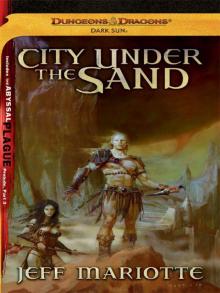 City Under the Sand
City Under the Sand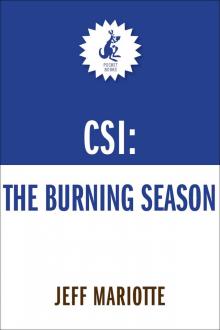 The Burning Season
The Burning Season Sanctuary
Sanctuary Winds of the Wild Sea
Winds of the Wild Sea Serpents in the Garden
Serpents in the Garden Close to the Ground
Close to the Ground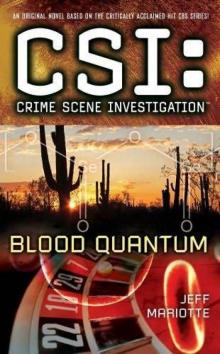 Blood Quantum
Blood Quantum Brass in Pocket
Brass in Pocket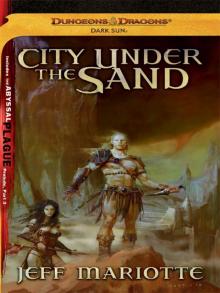 City Under the Sand: A Dark Sun Novel (Dungeons & Dragons: Dark Sun)
City Under the Sand: A Dark Sun Novel (Dungeons & Dragons: Dark Sun)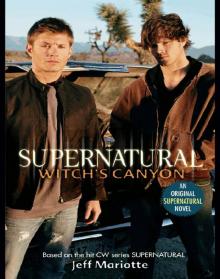 Witch's Canyon
Witch's Canyon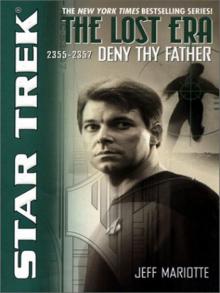 STAR TREK: The Lost Era - 2355-2357 - Deny Thy Father
STAR TREK: The Lost Era - 2355-2357 - Deny Thy Father Dawn of the Ice Bear
Dawn of the Ice Bear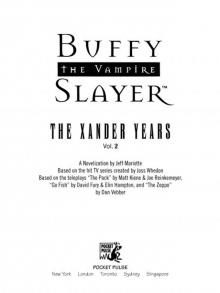 The Xander Years, Vol.2
The Xander Years, Vol.2 Ghost of the Wall
Ghost of the Wall 30 Days of Night: Light of Day
30 Days of Night: Light of Day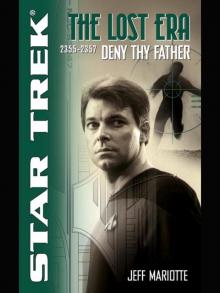 Deny Thy Father
Deny Thy Father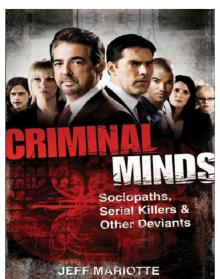 Criminal Minds
Criminal Minds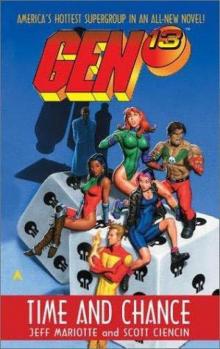 Time and Chance
Time and Chance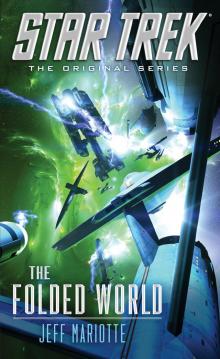 The Folded World
The Folded World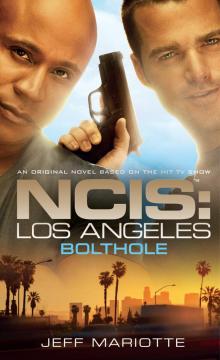 Bolthole
Bolthole Narcos
Narcos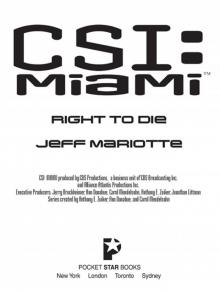 Right to Die
Right to Die